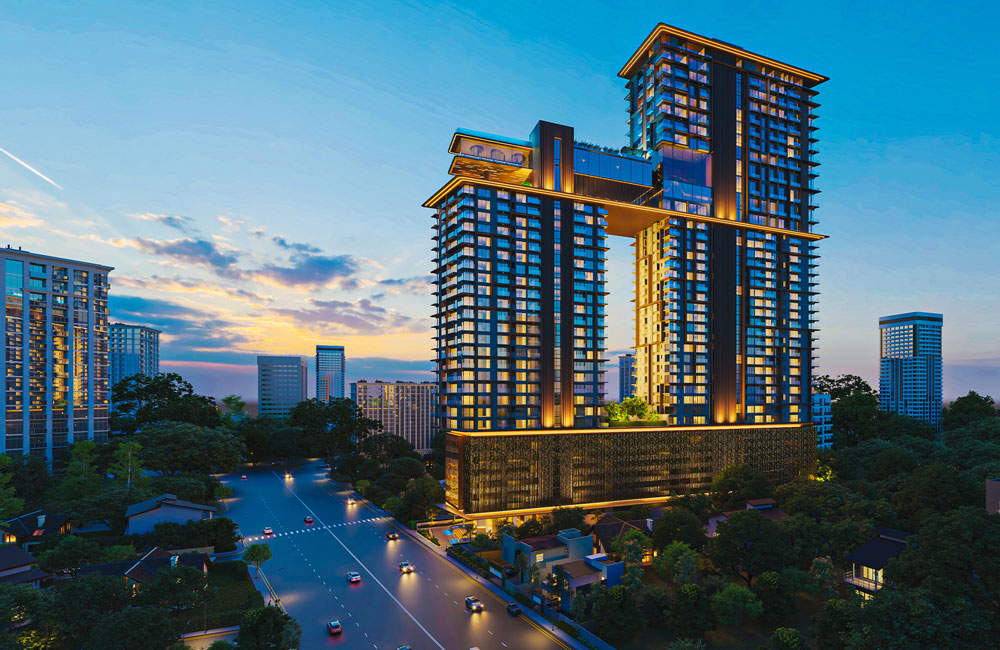Luxury Tower or Legal Tangle? The Pentara Residencies Saga UnfoldsWhen Home Lands Group unveiled its glittering Pentara Residencies project in Colombo’s Thummulla on June 21, it was hailed as a defining moment in Sri Lankan real estate the country’s largest single investment by a local developer in a 40-storey luxury apartment complex. Yet, behind the gleaming façade and high-profile endorsements lies a tangled web of alleged zoning violations, irregular approvals, and mounting public outrage.
Home Lands Group, which acquired the one-acre land parcel for Rs. 4.5 billion in 2025, now finds itself at the centre of a storm. What was touted as a triumph of Sri Lankan entrepreneurship has instead raised questions about the integrity of the approval process and the role of the Urban Development Authority (UDA).
Colombo’s high-rise constructions are governed by stringent regulations under the City of Colombo Development Plan and the Housing and Town Improvement Ordinance. These rules dictate zoning classifications, floor-area ratios, height limits, and environmental clearances. In Thummulla, a zone reportedly categorized as a special residential or green zone, the maximum permitted height is believed to be five to six stories a far cry from the 40-storey behemoth now under construction.
Residents argue that this colossal structure violates the city’s zoning and environmental safeguards. Complaints lodged with the UDA, the Road Development Authority, and even the President and Prime Minister’s offices claim that approval was granted unlawfully by misclassifying the land as a mixed-development zone.
A local activist, Jinath Premaratne, voiced public sentiment bluntly:“This is not just about aesthetics or personal inconvenience it’s about the law. You can’t change zoning maps to suit one developer. Colombo’s last green pockets are vanishing.”
In recent months, residents from the Clason’s and Tickell’s areas have staged protests, accusing the UDA of applying double standards denying ordinary citizens permission to build beyond three floors, while greenlighting a 40-storey luxury complex.
n parallel, the Mathrubhumi organization, a civic watchdog, announced it would take legal action against the UDA Chairman, alleging that the project’s approval was both irregular and corrupt. According to Mathrubhumi, internal UDA documents and planning guidelines show three glaring irregularities:
Zoning Violation: Land designated as residential was treated as mixed-development.
Exceeding Height Limit: Approval was granted for 120 metres despite a legal cap of 50 metres.
False Frontage Records: A street frontage of under 30 metres was recorded as 40 metres to meet UDA requirements.
Home Lands, however, maintains that all statutory and environmental approvals were properly obtained including clearances from the National Building Research Organization (NBRO) and the Environmental Consultative Committee (ECC). In a statement, the company affirmed that “Pentara Residencies has full UDA clearance to proceed”, insisting that the project meets every legal and environmental standard.
Chairman Nalin Herath defended the project:“Pentara is progressing exactly as planned. We remain fully compliant and committed to transparency.”
Meanwhile, the former UDA Chairman, identified as Kumudulal, filed a police complaint claiming that recent media reports alleging corruption were false and defamatory. Yet, police sources confirm that 17 separate complaints have already been filed by residents against him — suggesting that public concern, not media fabrication, lies at the heart of the dispute.
Sources within the UDA claim that even after his official removal, the former Chairman has continued to act as “Chairman” in an interim capacity, calling Board of Management meetings and exerting influence over the institution. Reports suggest he planned to convene another such meeting at Waters Edge Hotel, raising eyebrows about his continued authority.
The controversy has now drawn the attention of Urban Development Minister Bimal Ratnayake, who faces mounting pressure to order an independent investigation into the approval process, potential bribery, and administrative malpractice.
Beyond the legal maze and political intrigue, the Pentara Residencies controversy reflects a deeper crisis of governance. The rapid urban transformation of Colombo has often come at the cost of transparency, environmental balance, and public trust.
As Mathrubhumi’s convener Sirimali Liyanagama put it:“No tower should rise higher than the law itself. If corruption is ignored, it’s not just a skyline that’s being reshaped it’s the rule of law.”
With legal battles looming and investigations promised, the Pentara story is far from over. For now, Colombo’s most ambitious housing project has become a symbol not of progress, but of how power, profit, and public accountability collide in Sri Lanka’s urban future.

Leave your comments
Login to post a comment
Post comment as a guest